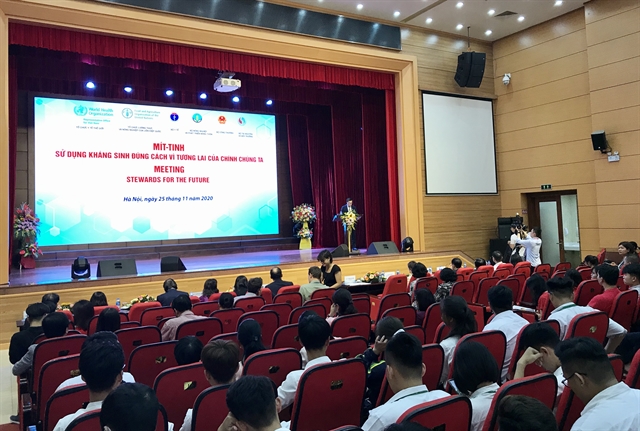 Society
Society

Experts have called for further action today to preserve the effectiveness of antimicrobials at a meeting held on the occasion of the World Antimicrobial Awareness Week in Việt Nam.

|
| Experts call for further efforts to preserve the effectiveness of antimicrobials at a meeting held today on the occasion of the World Antimicrobial Awareness Week in Việt Nam.— VNS Photo Thanh Hải |
HÀ NỘI — Experts have called for further action today to preserve the effectiveness of antimicrobials at a meeting held on Wednesday on the occasion of the World Antimicrobial Awareness Week in Việt Nam.
World Antimicrobial Awareness Week (WAAW) aims to increase awareness of global antimicrobial resistance (AMR) and to encourage best practices among the general public, health workers and policy makers to avoid the further emergence and spread of drug-resistant infections.
At the event, the Ministry of Health (MoH) and Ministry of Agriculture and Rural Development (MARD) along with partners such as the World Health Organization (WHO) and the Food and Agriculture Organisation of the United Nations (FAO), committed to working together to help stop the overuse and misuse of antibiotics in hospitals, farms and homes.
“We are taking action to tackle antimicrobial resistance (AMR). Today, we are launching a new set of guidelines to instruct hospitals on what they must do to better manage the use of antimicrobials,” said Deputy Minister of Health Trần Văn Thuấn. “We are also looking at data on drug resistant infections and antimicrobial consumption to develop policies to contain AMR.”
The Việt Nam National Action Plan on AMR is coming to an end this year, paving the way for the MoH and MARD to prepare a new National Strategy on AMR for 2021-30. The WHO, FAO and other partners are ready to support the Government in this endeavour.
“Though data on AMR in Việt Nam is limited, the rate of AMR in Việt Nam is alarming. Recent data collected at 16 sentinel hospitals in 2019 showed that about 82 per cent of Acinetobacter bacteria were resistant to carbapenems. Acinetobacter is common bacteria causing urinary tract infections or pneumonia. Carbapenems are one of the newest and most precious antibiotics reserved for known or suspected multidrug-resistant bacterial infections,” said Dr Kidong Park, WHO Representative in Việt Nam.
In Việt Nam, 16 national AMR surveillance hospitals across the country have been collecting data on AMR and reporting to the MoH since 2018. However, the country still has no data of people who have died from resistant infections; antimicrobial resistance rates at lower levels of the health system; antimicrobial consumption patterns in hospitals, farms or in the community; or how antimicrobials are being used.
“One of the WHO’s top priorities is to continue building national capacity for the surveillance of AMR and antimicrobial consumption in Việt Nam. This data is urgently needed to support policies on antimicrobial use in hospitals and in the community and to manage AMR epidemics,” said Dr Park.
“With this data, Việt Nam could update its prescribing criteria for antimicrobials, develop standard infection treatment guidelines for national versus smaller district hospitals, and benchmark hospital performance in antimicrobial stewardship. With these evidence-based and data-driven criteria and guidelines, the country will optimise the use of antimicrobial medicines and address AMR effectively,” said Park.
Rana Flowers, FAO representative, said that within the next 10 years, the amount of antimicrobial use in livestock production was projected to nearly double in an effort to keep pace with the food demands of the growing population.
“The food and agriculture sectors therefore would have a pivotal role to play in reducing AMR epidemics. At every stage of the food chain, measures must be taken to use antimicrobials sparingly and responsibly, thus slowing the development and spread of AMR,” said Flower.
Hailed as a marvel in modern medicine, antibiotics had been a game changer in defeating dangerous bacteria – enabling more children to survive and the life expectancy of adults to be extended. However, years of overuse and misuse of antibiotics, by humans as well as for animals, had enabled the bacteria to build resistance to antibiotics, rendering them largely ineffective. Around the world, people, plants and animals were dying from infections that could no longer be treated – even with our most advanced antimicrobials., according to the WHO. — VNS




